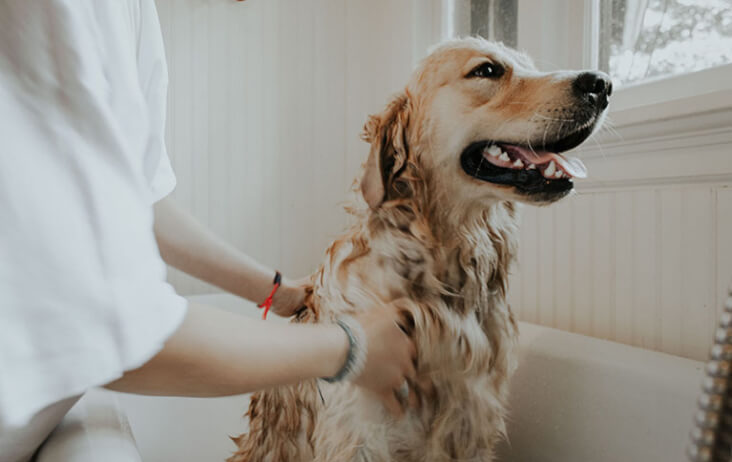There’s one myth about dogs that doesn’t seem to go away.
That’s the one about baths being bad for a dogs skin.
Tracing the origins of it, it comes from a time when bathing was done wrong, mainly using chemicals or laundry detergent that are bad for a dogs skin. This in turn lead to a dog baths getting a bad reputation.
The truth is that bathing done right is not harmful.
In fact, when done right they are an important part of helping nearly all skin problems. More so, dogs who suffer from particularly greasy, flaky, dirty or itchy skin can really benefit from proper bathing.
Now that we have got that covered here is a quick way to help your dog get a better good wash.
First make sure you are using a special mild dog shampoo, not baby shampoo, or human shampoos. That’s because a dog’s skin is naturally more alkaline, where as most human shampoos are made for a more acidic environment. This difference can cause a reaction that flares up skin problems on a dog.
When you start to wash your dog make sure the water is lukewarm. Unless the shampoo is tearless, keep it away from your dog’s eyes, as this can damage the cornea.
When finished gently dry your dog down and clean their ears with a soft towel or cotton balls. This can help prevent ear infections caused by trapped moisture.
Good Shampoo Ingredients & What They Do…
Tea tree: Antibacterial, slightly antifungal, and a mild itch reliever.
Sulfur: Reduces excessive skin flaking, antibacterial and antifungal, and a mild itch reliever.
Selenium sulfide: Found to reduce excessive skin flaking and greasy skin – however it be irritating to a dog if used too often.
Benzoyl peroxide: Antibacterial and helps clean pores and greasy skin. However like Selenium sulfide it can be irritating if used too often.
Aloe Vera: Help relieve dry or cracked skin.
Oatmeal: Moisturizes and soothes irritated skin. Often recommended to dogs with allergic skin or mild itchiness.
If Your Dog Still Smells or Is Greasy…
If you are regularly bathing your dog and they are still smelling or greasy afterwards, then it’s a sign that they could have parasites, seborrhea, or an underlying skin infection which you should get checked out with your vet.







Comments